| Robert Gutierrez to be Awarded Air Force Cross | |
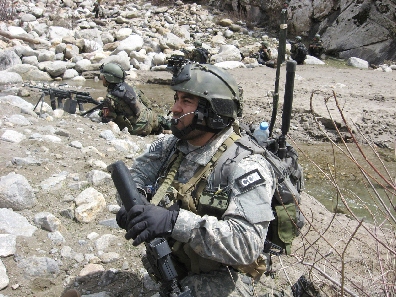 |
For
a moment on Oct. 5, 2009, Air Force Staff Sgt. Robert Gutierrez thought
he might die in Afghanistan.
Gutierrez and a team of Green Berets from the 7th Special Forces Group were pinned inside a building in Herat province, outnumbered by Taliban fighters and without an escape route. As a Combat Controller, it was Gutierrez's job to call in and direct air support. But Gutierrez could barely talk. A gunshot wound to his chest had collapsed a lung while narrowly missing his heart. The Special Forces team leader also was shot. Despite his injuries, Gutierrez kept fighting, leveling his M-4 rifle toward enemy fighters while refusing to relinquish his radio. He had to, he said. Otherwise, he'd be a burden to the Green Berets around him. |
For his actions that day, Gutierrez will be awarded the Air Force Cross this fall.
The award, the highest an Airman can receive outside the Medal of Honor, is approved by the president.
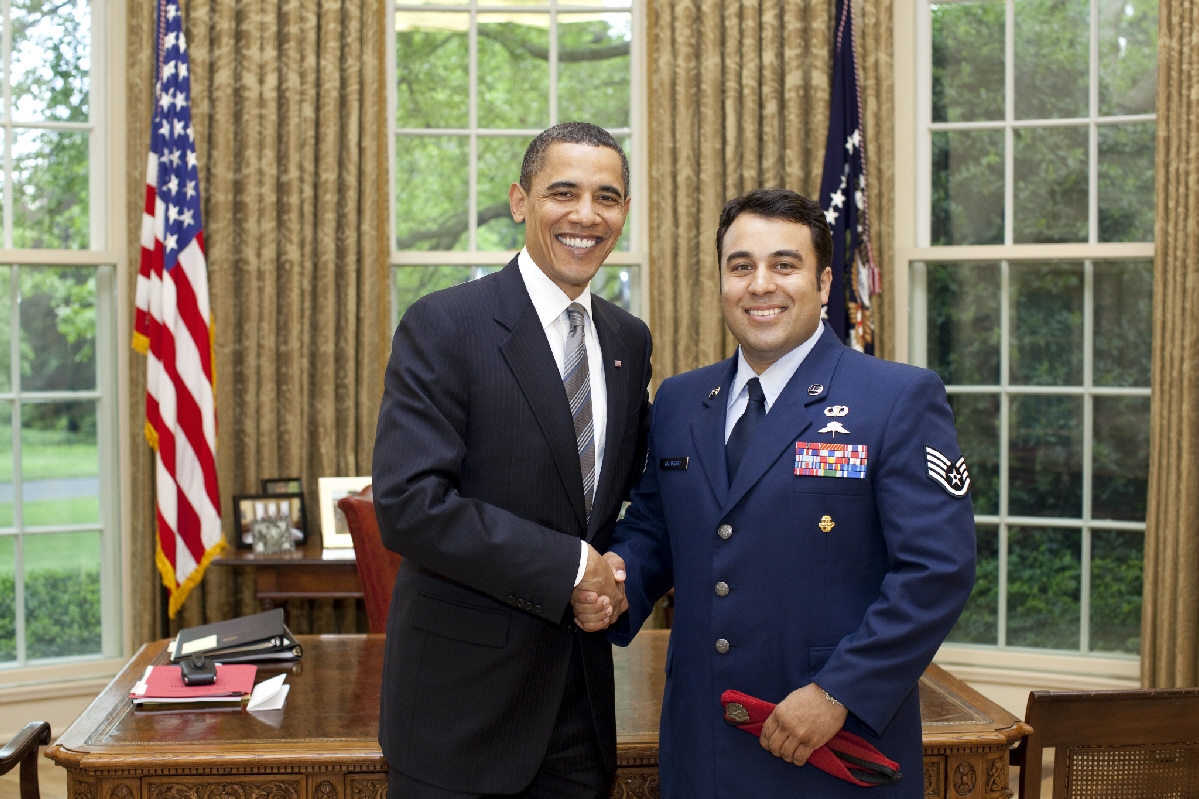
A spokeswoman for Air Force Special Operations Command said the medal is expected to be announced today by Gen. Norton Schwartz, chief of staff of the Air Force, during the Air Force Association Convention.
Gutierrez will receive the cross in late October during a ceremony at Hurlburt Field, Fla., where he is currently assigned, the spokeswoman said.
As the team medic treated his injuries and inflated his collapsed lung, Gutierrez called in three strafing runs from an A-10 Warthog, obliterating the enemy and allowing the team to make it out alive.
"I refused to give up on that soil," Gutierrez said. "If I did, I would be a burden to my team and that was unacceptable. So I just drove on."
The strafing runs were so close -- enemy fighters were estimated to be only 30 feet away -- that Gutierrez's eardrums burst.
"Throughout the four-hour battle, Sgt. Gutierrez's valorous actions, at great risk to his own life, helped save the lives of his teammates and dealt a crushing blow to the regional Taliban network," says a citation that will accompany Gutierrez's medal. "Through his extraordinary heroism, superb airmanship, and aggressiveness in the face of the enemy, Sgt. Gutierrez reflected the highest credit upon himself and the United States Air Force."
The battle for which Gutierrez is being recognized came during a high-risk nighttime raid to capture the Taliban's second-in-command for the region, according to the citation, which was released ahead of today's announcement.
Gutierrez said he paid little attention to his injuries, crediting his training for helping him concentrate on his duties and the Special Forces medic for saving his life.
"My main focus was to eliminate the threat because the situation and problem was not about me, it was about making sure that my team would be covered and safe," he said. "He was one of the best medics I have ever worked with, and I had the utmost confidence in him."
Gutierrez, 31, will be the second living Air Force Special Operations Soldier to receive the Air Force Cross and one of only five total, according to Air Force Special Operations Command.
The medal itself, which dates to 1964, has been awarded fewer than 200 times.
Gutierrez joined the Air Force in March 2002, just months after being added to a waiting list at a recruiter's office after the Sept. 11 terrorist attacks.
He tried to enlist the day after the attacks, Gutierrez said, but recruiting stations were closed.
Earlier this month, Gutierrez was one of five service members to accompany Defense Secretary Leon Panetta on a visit to the 9/11 memorial and One World Trade Center site in New York.
Gutierrez said he became a Combat Controller because he wanted to make "as much impact against the enemy as possible."
From September 2009 until April, Gutierrez was based with Pope's 21st Special Tactics Squadron.
Gutierrez had seen combat on several prior deployments, but he had never been seriously injured before the Oct. 5, 2009, battle, he said.
In addition to the bullet wound, collapsed lung and ruptured eardrums, Gutierrez broke two ribs during the attack.
The months after the battle included multiple blood infections, three blood transfusions and seven surgeries.
Nearly two years after the battle in Herat, Gutierrez is stationed at Hurlburt Field, Fla., where he serves as an Air Force Special Operations training instructor.
Earlier this year, he told Air Force Magazine that he was about 98 percent recovered but still had limited movement in one arm.
From Hurlburt Field, Gutierrez is close to the new home of the 7th Special Forces Group, which moved from Fort Bragg to Eglin Air Force Base this year.
Gutierrez said he still has a close bond with members of the Special Forces team that he helped save.
|
|||
 |
Schwartz
Presents AF Cross, Silver Star October
31, 2011
Air Force News
HURLBURT
FIELD, Fla. -- Two Air Force Special Operations Command Combat
Controllers were presented military decorations here Oct. 27 by the Air
Force chief of staff for exhibiting extraordinary heroism in combat. |
||
|
Staff Sgt. Robert Gutierrez Jr. was presented the Air Force Cross and Tech. Sgt. Ismael Villegas was presented the Silver Star by Gen. Norton Schwartz in a joint ceremony. The Air Force Cross is the service's highest award and is second only to the Medal of Honor. The Silver Star is awarded for valor, to include risk of life during engagement with the enemy. Both Airmen received their awards for gallant actions during combat operations in 2009 that directly contributed to saving the lives of their teammates and decimating enemy forces. Gutierrez and Villegas were both assigned to the 21st Special Tactics Squadron, Pope Field, N.C., when they deployed in support of Operation Enduring Freedom in 2009, although the two medals are not related to the same operation. Freedom Hangar was a sea of berets as more than 1,000 gathered to watch Schwartz present the Airmen their awards.
The general
credited the two Combat Controllers for not only being courageous, but
for also being humble in recognition.
"With the modesty that is characteristic of the quiet professional, these two joint terminal attack controllers would hardly hesitate to claim that, during the incidents for which they are being decorated today, they were merely performing as they were trained," Schwartz said. "And they are accepting the honors on behalf of the entire team that worked with them." Gutierrez and Villegas attribute their exceptional performance on the battlefield to training they received at AFSOC. "You don't have a lot of time to think about yourself," Villegas said. "Your training allows you to do your job so you can overcome any obstacle and ultimately bring brothers on the battlefield home safely." Gutierrez, now an instructor at the Special Tactics Training Squadron located here, is the second living recipient of the Air Force Cross. Like Gutierrez, the last five recipients of the medal have all been AFSOC Airmen. Gutierrez accepted the Air Force Cross on behalf of all of his fellow Airmen in combat. "It is for every Airman who is fighting," he said. "This is a representation of them and their sacrifice. I just get the honor of wearing (the medal) for them." Gutierrez received the Air Force Cross for actions during a four-hour battle in Herat Province, Afghanistan, in October 2009. The team was ambushed during a high-risk night raid to capture the number two Taliban leader in the region. The team leader was shot in the leg, and the remaining ten-man team was trapped in a building with no escape route. Assigned as the joint terminal attack controller to an Army Special Forces detachment, Gutierrez's job was to call in air support for his teammates. During the firefight, he was shot in the chest and suffered a collapsed lung. Still, Gutierrez continued to return fire while calling in precision strafing runs from an A-10 Thunderbolt II nearby. Though bleeding out and struggling to inhale enough oxygen to breathe, let alone speak into his radio, death was not on his mind, he said.
For Villegas, learning he would receive the Silver Star came as a surprise to the Del Rio, Texas, native. "I didn't expect this. I was told I was nominated, and it was an honor. But to receive it ... it's the biggest honor I can have," he said. "This is for my guys. They put their lives on the line each day. I'm taking this on behalf of all of those guys out there." In September 2009, Villegas was clearing a road of improvised explosive devices near Bagh Khosak, Afghanistan, when his team was ambushed. Villegas ran 200 feet across an open minefield to achieve a better position from which he could return fire with his personal weapon while calling in air support. As the only JTAC assigned to an Army Special Forces team, Villegas directed precision firepower from artillery, as well as fixed- and rotary-wing assets, to kill 32 enemy insurgents during the 16-hour firefight and save the lives of his teammates. While there were many heroes in the crowd wearing the Air Force uniform, Schwartz also pointed out the unsung family members who sacrifice for their Airman so they may serve their country. "Your quiet, understated sacrifice gives deep personal meaning to your loved ones' service," Schwartz said to the families of Gutierrez and Villegas. "You have my personal thanks and the appreciation of a grateful nation, and certainly the appreciation of the U.S. Air Force." Demetria Saucedo, Villegas' mother, said it is days like these that make the sacrifice worthwhile. "It was a lot of sleepless nights while he was gone, but today is a good day," Saucedo said. "I am so proud of my son." |
|||
My Air Force friend, my Army protector
Air Force Special Operations Command Public Affairs
10/31/2011 - Hurlburt Field, Fla. -- Army Sergeant First Class Michael Jones travelled alongside Staff Sgt. Robert Gutierrez from Lackland Air Force Base, Texas to Hurlburt Field, Fla., as they marched 812 miles together with 16 other Airmen in memory of 17 fallen special tactics Airmen.
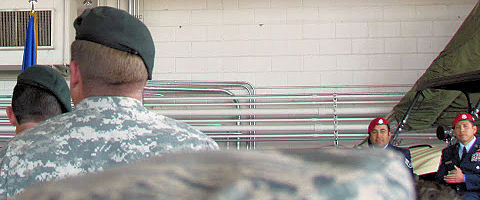 |
Jones,
a 7th Special Forces Group Airborne medic, was invited to participate
in the 2011 Tim Davis Memorial March as a colleague, but more than
that, as a friend of the special tactics community. Two years ago he
saved the life of Combat Controller Gutierrez, during a mission in
Afghanistan.
Gutierrez was assigned to the same Army unit as Jones. As a Combat Controller Gutierrez said he has worked with Marine Special Operation Teams and Navy Special Warfare Units, but he is usually assigned to the Army. "We primarily handle the austere airfield control, airfield seizures and fire support , but right now we're covering down on both ends downrange. |
The Air Force recognized the vital role the JTAC plays for the ground units. In his 2011 Vector, Chief of Staff of the Air Force Gen. Norton Schwartz, stated the Air Force increased JTAC support to 33 additional combat maneuver companies.
Jones echoes that support.
"It's very important for an Army Special Forces unit to have a Combat Controller," Jones said. "We bring the gun ammo and the Air Force brings the gun ammo and the bombs. If it's close quarters, room-to-room, we've got that. But if its something we can't handle, the JTAC's got aircraft right at the end of his fingers. The CCTs are part of our family now and we would give our life for them."
Gutierrez said it's about the team and everyone relies on each other. He said the teamwork required in combat is huge.
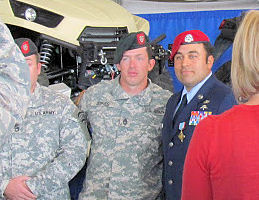 |
"You
have to depend on each other," Gutierrez said. "In reality, they are
the only Americans that I know and at that point you're closer than
family. You're in a foreign land fighting a foreign force in their
hometown, on their ground and it's them against you." For the 2009 mission, Gutierrez was in charge of air cover for his Army unit. Calling Jones his battle buddy, Gutierrez said Jones was never far from his side. They got to know each other very well. "On objective, I would be next to the Ground Forces Commander and Jones on every patrol," Gutierrez said. "I always knew where he was and he always knew where I was whether it was a combat reconnaissance patrol, key leader engagement or a direct action mission, I knew exactly where he was." |
"It was the fog of war," Jones said. "Everything happened so fast. The team quickly became surrounded and the enemy had the tactical advantage because they were shooting at us from less than fifteen feet away on the rooftops."
Gutierrez was inside a building returning fire to the rooftops through an opening and suddenly got shot. Jones looked over and saw Gutierrez.
"He said, 'Mike!' and I looked and you could tell something was wrong," Jones said. "I ran over, grabbed him and pulled him inside and he spit out a mouth full of blood. Literally the first thought that came to my head was that he's got a baby girl coming in December."
Jones tells Gutierrez to let him know once his breathing is hard. He took Gutierrez' kit and radio off but left his headset on as Gutierrez was still talking to aircraft. About 30 minutes into it he said he was having trouble catching his breath back and Jones administered a needle decompression, which allowed the removal of fluid or air from the chest.
Then they had to move out of there. Gutierrez called in for an A-10 strafing run and while the team was running out of the building, Jones jumped on Gutierrez to cover him.
"He jumped on me when the runs were going off," Gutierrez said. "He covered me with his own body to make sure I was ok, because I didn't have any armor on."
They ran about 1.5 kilometers to the landing zone for the medevac.
Jones said Gutierrez was talking to the gunships and the helicopters and calling in his own medevac. But once they got to the landing zone, Gutierrez told Jones he was having trouble breathing again and Jones had to give him another needle decompression.
Gutierrez said he felt confident that Jones would take good care of him.
"I completely trusted him," Gutierrez said. "I knew he was good and he knew what he was talking about. He was dedicated and loved his job. When someone loves their job that much and wants to do it that well, I had the utmost confidence in him."
Although Gutierrez was medevac'd out that night, the team continued the mission the next day. They were determined to get their man. That boosted Gutierrez' morale ten-fold as he lay in the hospital bed recovering.
| "I
was in Walter Reed when they told me," Gutierrez said. It made my
morale skyrocket because they went back out and got the number one guy
we were looking for and they did an awesome job. Honestly, you're
sitting in your bed and you've got five tubes coming out of your body,
and you hear about this, you talk about being happy and wanting to get
up and get out of there and carry on." Resilience is why Gutierrez and Jones are participating in the Memorial March and honoring the 17 fallen Airmen. "We're the same," Jones said. The guys that we've lost, they wouldn't want us to stop, they wouldn't want us to not keep going. If the same thing happened to me, I wouldn't want these guys to sit and think about it or anything like that. I would want them to keep going and just do their job." Gutierrez thanks Jones every chance he gets for saving his life and although Gutierrez says Jones is probably tired of hearing it, Jones says he's not. "Having Rob here and just being friends with him and his family, that's the most reward I can ever ask for," Jones said. "I get to see his daughter and know that she has her dad with her. |
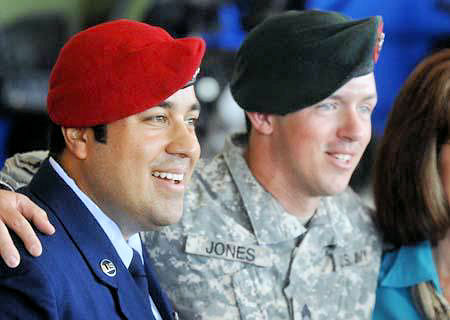 |
Gutierrez was awarded the Air Force Cross Oct. 27, the highest award the Air Force gives, for his actions during that mission which saved countless lives. He will be the first to tell you that he wouldn't have been able to accomplish that mission - or march to honor others - if it wasn't for Jones, who saved his life twice that night.


